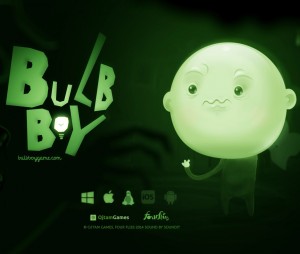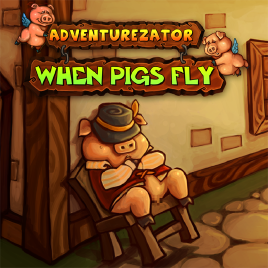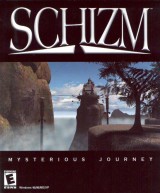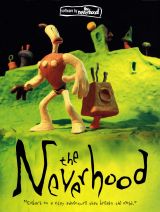Review for The Preposterous Awesomeness of Everything page 2
Joe Richardson’s The Preposterous Awesomeness of Everything is a simplified game in an outdated genre that replaces traditional animated cutscenes with walls of text so dense and rambling as to be almost impenetrable. There are so few puzzles that it almost isn’t a game at all. It would probably make more sense as an illustrated children’s book, but then there wouldn’t be any superfluous background animations to distract people from the poorly finished artwork. The story makes no sense, and really none of the elements on display show any special proficiency. There’s a self-parodying angle, as if acknowledging its own failings somehow excuses them, but really, in the end it’s just a snooty, self-aggrandizing piece of crap.
Whew, that’s harsh! So now that you know what the developer himself thinks of his own game, let me tell you my impressions.
Seriously, that scathing bit of self-deprecating criticism comes almost verbatim from a nudge-wink internal analysis (ostensibly about another game-within-the-game, but duh), proving quite definitively that TPAOE refuses to take itself too seriously, and that there are no sacred cows safe from a public skewering. The self-proclaimed “satirical adventure game” comes as advertised, going after multiple targets and cutting them down at the knees, from politics to social media, from terrorism to mindless groupthink. None of it is presented as a remotely realistic depiction of “our” world, but if you don’t see modern society in every absurd scenario you encounter, you really aren’t looking very hard. It isn’t all that subtle.
As with its commentary on larger issues, there’s actually a fair bit of truth in the game’s pseudo-self-evaluation. This is indeed an utterly bizarre game with a ridiculous premise, incredibly amateurish production values, and very little gameplay. You might be tempted call it a “bad” game, but that would sort of be missing the point. It knows it’s a not a good game in the traditional sense, and is entirely okay with that in the service of two things: being different, and making a statement. It’s not unlike a Monty Python cartoon: everyone knows the art is terrible, and absolutely nobody cares. The only questions to ask are whether it’s funny and whether it has something to say. With Python the answer is usually yes. With The Preposterous Awesomeness of Everything, the answer is decidedly more mixed. At times it’s so bad it’s good; at other times it’s just pretty bad.
The game dumps you unceremoniously onto a tropical island – or rather, half-tropical, half-desert, though you’re only allowed in the “Comfortable Area” for much of the two-hour play time. You’re a rather scruffy-looking dude with tussled hair and a giant nose. Oh, and you’re butt-naked. Luckily for your dignity, the private parts are blatantly blurred out, as are those of the other island inhabitants who are similarly under-attired. You’ll meet these characters in the measly two other scrolling areas available at the start. Both the locations and its denizens (including you) undergo significant changes over the course of the game, and eventually you’ll branch out to the “Barren” side of the island, but for at least half the game you’ll bounce between a beach, an inland clearing, and a clifftop with a view.
Unless I’m reading too much symbolism into the game – and if I am, I blame Richardson as he laces it with all kinds of “hidden” meanings – the entire experience can be seen as a very loose interpretation of humanity’s evolution (or devolution, depending on how you see things). At first everyone is primitive, picking fruit with names like “High-Up-Non-Moving-Pink-Food” or carnivorously devouring a bloody raw feast of “Big-Hairy-Moving-Food-With-Horns.” The silent majority are dangerously cavorting about with strange machine parts they know nothing about, and only the island’s lone intellectual knows that they belong to a rocketship. (He’s also the only one civilized enough to sport a loin-leaf and perfect handlebar mustache while speaking in uppity airs, so you KNOW he’s the smart one.) His name is Drake, and he agrees to build the ship if you can get the great unwashed masses to stop goofing off.
Doing so involves mastering another ancient tool: the SCUMM interface! Not quite as antiquated as the early Cro-Magnons, perhaps, but still pretty old-fashioned at this point. Yes, while the main view screen is filled with absurdly constructed collages, at the bottom-left is a collection of nine verbs. There are all the usual suspects, like “pick up”, “talk to” and “use”, and the default is always set to “examine” for an initial look-see, but there are also some zany actions like “disrespect”, “pray for” and “befuddle”. Sounds like a great way to interact with such an outrageous world, but far too often all you’ll get is a canned failure message instead of an unpredictable result or at least a witty retort. That’s too bad, because the island hottie Helen does a great job of out-befuddling you in debating the chicken-and-egg origin. Still, it’s nice to know you can randomly “do a back-flip” when the mood strikes.
The developer undersells the number of puzzles in TPAOE, but the gameplay is indeed pretty basic. You’ll collect a handful of items that appear as crisp, clear icons in the inventory right beside the verb selections. For much of the game there are so few objects to collect and locations to visit that there isn’t much complexity, but you can’t entirely sleepwalk through the game either, as a couple puzzles involve multiple steps. I’m rarely offended by anything in games, but one puzzle solution had me momentarily irritated, before realizing it was perhaps a sad but entirely appropriate indictment of modern sexual voyeurism. Make the wrong choices at times and you can even fail with disastrous, game-ending consequences. This is meant to be a fun event, however, offering detailed descriptions of catastrophic outcomes before giving you the chance to continue from the point of your fatal mistake. If you need a nudge, a quick conversation with Drake will clarify your current priorities, and possibly offer some helpful advice.
Eventually you’ll succeed in freeing up the rocket parts, at which point an abrupt change in circumstance equates to a massive leap forward in evolutionary progress. No longer a race of ignorant nudists, now the populace is fat and lazy and dumb, while the island itself is cluttered with useless junk. (Nothing like progress to make us complacent!) A bar and dance floor placate the masses, who are now bedecked in Hawaiian shirts, shades, and other tourist paraphernalia (hm). A tube of toxic green sludge pumps directly into the once-pristine sea (hmm), while foodstuffs are jealously hoarded by those who already have the most (hmm!). More importantly, twins Brad and Dan now oppose each other for the job of rocket-building project manager, although the only difference is that one favours glue and the other masking tape. Each campaigns with blatant lies, derogatory insults, and unkeepable promises in order to get the position, at which point all they accomplish is undoing the other’s work before the next election (HMMM!!)
This is never going to work (everyone knows staples work best on spacecraft), so it’s up to you to win the job instead. Naturally you’ll become ensnared in perpetual bureaucratic red tape, but not only do you need to secure the forms necessary to compete, you’ll also need to convince enough people to support you from among the three kinds of voters, the (and I quote) dinguses, twits, and morons who blindly follow party lines. You’ll also need to silence the “Man with the Little Pencil”, who’s sold his integrity as a newsman for mass-market appeal and now writes disparaging things about you. At long last you’ll make your way to the other side of the island, a desolate desert of dirt and sand and “nothing” for miles around – the signs even say so. A “dangerous lunatic” is imprisoned here, and a metal detector is a required security measure. (Please tell me I don’t need to spell all these references out.)
Both sides of the island are depicted by a patchwork of realistic-looking elements to form a very unrealistic-looking whole. Presumably Richardson helped himself to a variety of free art sources: Drake’s clifftop features stacked jars of jam, a gramophone, and an abacus beside his functional model rocket, while a group of all-talk-no-action protesters roast marshmallows on the beach. Character designs are even more cobbled together: one of the twins wears both a hardhat and crown upon his head, while a security guard dons half a suit of armour over top of the striped Swiss Guard uniform; another man is inexplicably dressed in a bird costume high up in the treetops. There isn’t a whole lot of ambient animation, and everyone besides the protagonist stays rooted in place, but many of them have their own little self-contained activity loop.
Each character has large, fake lips plastered onto their faces that move when they talk, though not all of them do. In fact, you can only speak to maybe half of the island’s inhabitants, engaging them in surprisingly short and disappointingly dull conversations. And when I say “talk”, I really mean “text” because there is no voice acting at all in this game. There is a fair bit of reading involved to get the most out of TPAOE, most of which comes in the form of distinct screens of several full paragraphs each. This is where the bulk of the story is conveyed, as well as the more pointed commentaries on societal ills. Some of it is quite amusing and satirically insightful, but it’s a shame more of it couldn’t have been integrated better into the actual gameplay.
These text screens are often accompanied by a variety of bizarre string (ukulele?) pieces. This stands in stark contrast to the main game, which features only silence in some areas, while others are backed by area-specific accompaniment, like techno-beats at the bar and a vinyl clarinet recording for Drake. Sound effects are few and far between, apart from the odd fire crackle or lapping wave upon the shore. Late in the game there are some additional “experimental” scores with synths and percussion to suit the dramatic new locations that suddenly open up, but I’ll leave those to players to discover for themselves. There isn’t much (read: anything) to do in those scenes, unfortunately, so you won’t be hearing them long.
TPAOE saves automatically as you progress, which I was thankful for when it glitched up on me so completely that I had to uninstall/reinstall the entire game to get it working again. Other than that, it ran pretty well for a coding-deficient developer who considers himself just a “misguided twit with a dream”. There is no actual “end” of the adventure, as it grapples with the destructiveness of humankind and the future of our race before looping back completely on itself. I like that idea, and Drake even plays up the “journey not the destination” philosophy, but since there really isn’t a whole lot more to see or do the second time around, it’s kind of a pointless exercise. I had more fun clicking the silly “cat pops up” button on the splash screen than replaying the actual game.
The score is the least relevant part of any review (though it’s often given the most attention), but that’s especially true here. By absolutely no reasonable metric can The Preposterous Awesomeness of Everything be considered a great game. The story is threadbare, the presentation simplistic, the gameplay rudimentary. So I’m giving it two stars… and yet, none of that really matters. This is really a one-note, 100% "indie" creation that clearly isn't meant for everyone, but if you’re interested at all in a totally off-the-wall bit of social satire dressed up in silly clothes – sometimes funny, always irreverent, with a whole lot of nonsense in between – you’ll find exactly what you’re looking for in Joe Richardson’s little island adventure. Awesome: no, but preposterous: yes, with everything that entails.




























